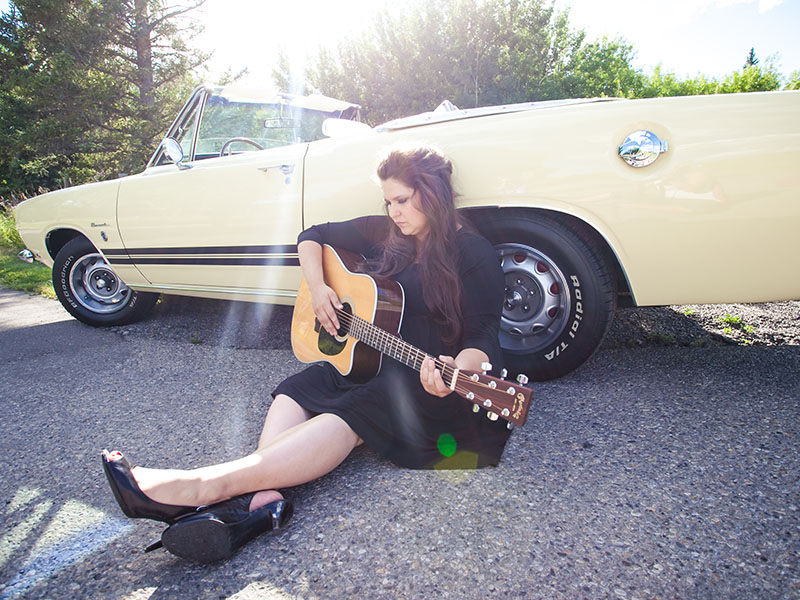Joni Delaurier
Creating words drives this passionate musician's professional and personal life
Growing up in Swan River, Manitoba, in a musical-minded home, Joni Delaurier, like a lot of bright but isolated Canadian kids, needed an escape hatch.
She needed a way to imagine what life might be like past the highway where Swan River ended and the vast, cold, forbidding Manitoba landscape started.
Delaurier fell in love—with words.
“When I was growing up, that was my lifeline to a different world,” she says.
When she was a kid, there was no internet. Instead, there were her grandma’s Reader’s Digest Condensed novels.
“I don’t think anybody in my family was paying real close attention and they were a little bit mature for my grade level, but I just soaked it all up,” she says.
One of those novels, which swept Delaurier off to a world of the American south, magnolia blossoms, the Civil War, the burning of Atlanta, and an unforgettable love affair, lodged in her imagination.
“Gone With the Wind is one of my favourites,” she says. “It’s not a light read, for a 13, 14-year-old, but I couldn’t get enough of it—and it was just escaping into another world.”
It was at that age that Delaurier also composed her first song for a jazz quartet that performed with the school band.
“The first song’s name was Wind Dancer, which now, looking back, is particularly cheesy,” she says, “but it had a little bit of flute overtones.”
Her mom loved to play Elvis records, and Conway Twitty too (she’s named after a Conway Twitty tune). Her friend’s dad gave her a cassette tape to listen to. It was the early 1960s BBC Recordings of The Beatles, their early tunes, such as Love Me Do and Please Mr. Postman.
“I was about 15 and was like, what is this? So good,” she says.
Even as a teenage girl, she also listened with a second set of ears, those of an aspiring songwriter, making mental notes about what goes into making a song memorable.
“I just loved the harmonies, and everything about it. It was so catchy,” she says. “As a songwriter now, I can appreciate that, because that’s what I would call ‘recall’—the ability to sing along the second time you hear it.”
Women of Country Rising
Delaurier now, decades later, has written hundreds of songs. One of them, Pickup Truck, which she wrote with her husband Troy Kokol, was nominated as Song of the Year at the 2007 Canadian Country Music Awards, after it was recorded by Shayne Yellowbird and won the national SOCAN award in 2008.
She divides her time between Calgary and making songwriting jaunts to Nashville, where there’s a growing scene of Alberta women—the next generation after Terri Clark—making inroads into the global capital of country music.
There’s Tenille Townes, from Grande Prairie, who just got some major ink in Rolling Stone; Lindsay Ell, from Calgary, who performed on the mainstage at Country Thunder, the biggest North American country music festival; Patricia Conroy, who co-wrote a song that Trisha Yearwood just recorded.
Throw in Jess Moskaluke, Tenille Arts, from Weyburn, Saskatchewan, young rising Calgary roots singer songwriter Mariel Buckley, and songwriters like Michela Sheedy and Kaley Bird, in addition to Delaurier, and you have a something happening that’s creative, organic, and purely western Canadian in tone, timbre, and sensibility.
And don’t forget about Clark, who treated 17,000 rowdy country fans to a sensational set at Country Thunder in 2019, not long after being inducted into the Canadian Country Music Hall of Fame.
For Delaurier, it all goes back to the delicate act of composing a song, creating a hook, and finding the perfect set of pipes to bring it to life.
“You want people to sing along,” she says.
“I feel like we’re all carrying around a lot, and connecting with music, whether something joyful or something sad,” she adds. “If they’re able to sing along, or they feel like they’re part of something important, I don’t think there’s a better gift we can give for people than to lighten that load for them and give them a way in to something that they love.
“That’s my job as a writer.”
Falling into a Hole
Speaking of joyful or sad, that about defines one unforgettable year in Delaurier’s life, when she not only married Kokol, whom she met at the Calgary Songsmiths group, then discovered she had thyroid cancer.
“I was a newlywed, so cancer wasn’t something that I was really planning on,” she says, “but we really got that in-sickness-and-health thing out of the way.”
The prognosis for her health is good.
Back then, however, the tumors were perilously close to her vocal chords.
Delaurier had to go from singer-songwriter to something else entirely, and she didn’t quite know what.
“When I would actually physically sing, it felt like the notes fell into a hole,” she says. “It was a really weird thing.”
She stopped writing songs. She didn’t sing. She didn’t really know what lay ahead.
She renovated the bathroom. She meditated. She visualized, better days, with no hole where her songs used to be.
“One day, my husband heard me singing in the shower, and he leaned on the bathroom door, and he shed a few tears because he said, she’s back,” she says.
Delaurier gets emotional when she talks about that moment in her life—and she’s written a few songs about what it means to be a cancer survivor, and hasn’t really put them out there into the world yet.
She knows other songwriters who weren’t so fortunate.
One was Mandy Ringdal, a Saskatchewan singer-songwriter who was building a career, and creative life, that was cut short by ovarian cancer.
“Everyone looked up to her in the music industry. Because she found out her prognosis was not good, I think for her, it fueled her more to leave that legacy behind before her time was up.
“Now,” she adds, “we have her great songs that live on and that’s something pretty tangible.”
Big Small Town
Delaurier came to Calgary 22 years ago, to go to school in a city that people sometimes describe as the biggest small town you’ll ever live in.
She’s still here, even though there’s Nashville, and Toronto and all those other metropolises out there, Delaurier feels there’s just as many professional reasons to live here as personal ones.
“It’s always been this country music town,” she says, “but now there’s an undertone of creation that’s happening here that goes beyond performance.
“There’s some fantastic studios. There’s more of a songwriting community. My husband and I are quite involved in a local songwriting group that we actually met through, called the Calgary Songsmiths and we give back through that.
“The Music Mile is going to be amazing,” she adds. “The fact that we have invested in the National Music Centre—Calgary is screaming awesome destination when it comes to music, so I think that’s why everyone else should love it here.”
Why Live a Creative Life?
“I’ve had experience with something that threatened to shorten mine,” Delaurier says.
“I say this with all honesty and not just to sound cheesy or corny or like a self-help guru,” she adds, “but if you don’t have something that you can’t wait to do, that nobody pays you to do… I don’t think that shortening your life is going to be the problem.
“Find something to fall in love with,” she continues. “You have been given many gifts, whoever you are.
“And it’s on each of us to find that attachment to something that we love and can benefit and flow through others.”
As far as music goes, it all brings Delaurier back to her mom, and her inordinate passion for Conway Twitty that caused her to name her daughter after his song Don’t Cry, Joni.
“My mom is a fairly meek-mannered woman, and she went to Nashville for the first time,” she says. “It was a bus tour of the stars homes, and my mom shimmied a little bit up a tree and peeled a piece of bark off Conway Twitty’s tree—and I’m thinking, only music can make mild-mannered people be a little bit on the edge.”
On November 16, 2015, Calgary Arts Development hosted a working session with approximately 30 creative Calgarians from various walks of life. Many of the small working groups voiced the need to gather and share more stories of people living creative lives.
That need has turned into The Storytelling Project.
The Storytelling Project raises awareness about Calgarians who, by living creative lives, are making Calgary a better city, effecting positive change and enriching others’ lives.
That need has turned into The Storytelling Project.
The Storytelling Project raises awareness about Calgarians who, by living creative lives, are making Calgary a better city, effecting positive change and enriching others’ lives.
The Storytelling Project raises awareness about Calgarians who, by living creative lives, are making Calgary a better city, effecting positive change and enriching others’ lives.

Have a story to share? Email us at submissions@calgaryartsdevelopment.com.
